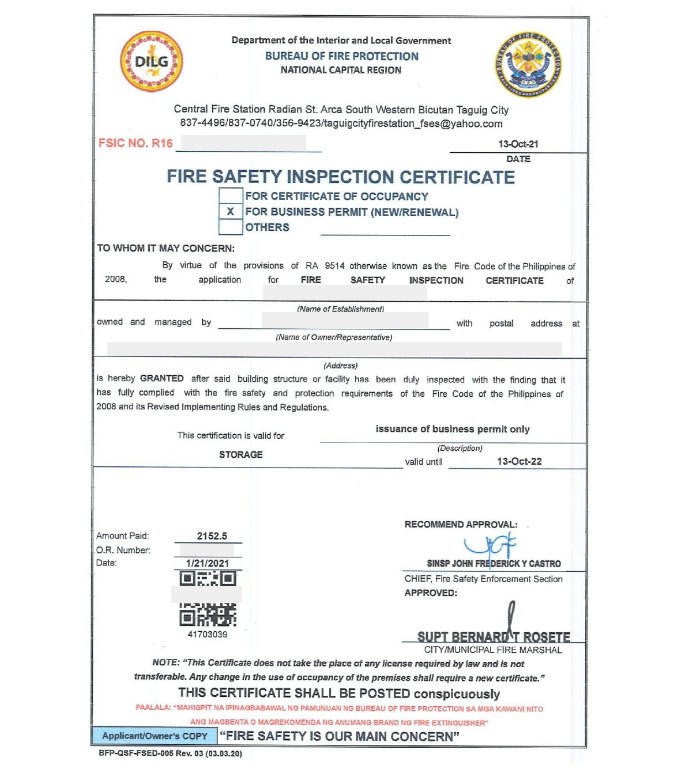Fire incidents pose a significant threat to businesses, often with devastating consequences that inevitably extend far beyond the immediate physical damages. From partial or complete destruction of properties to the interruption of operations and deaths, the impact can cripple a business.
Many entrepreneurs, who have gone through these catastrophic episodes, can always underscore the critical importance of compliance with the fire safety regulations. Such compliance starts with having the business establishment inspected by the relevant government agency and issued a Fire Safety Inspection Certificate (FSIC).
In this article, we’ll cover almost everything that you need to know about this business registration and compliance certificate, from its definition and legal bases to the application requirements, process, and fees. Read on and tell us in the comments how we can assist you with your business needs.
What is FSIC?
A Fire Safety Inspection Certificate, or FSIC, is a document issued to business establishments by the Bureau of Fire Protection (BFP) attesting their structures and facilities have been duly inspected and compliant with the fire safety standards under the Fire Code of the Philippines and other regulations.
Fire Code of the Philippines
The Republic Act No. 9514, also known as the “Fire Code of the Philippines of 2008,” which repealed P.D. 1185, primarily aims to promote economic development through the prevention and suppression of all kinds of destructive fires and the professionalization of the fire service.
Its Implementing Rules and Regulations (IRR) serves as the basis that guides the Bureau of Fire Protection (BFP) in enforcing the law to maintain public safety and economic development by preventing and suppressing all types of damaging fires.
Established under the reorganized Department of Interior and Local Government (DILG) by virtue of R.A. 6975, the Bureau of Fire Protection (BFP) is an agency mandated to enforce the Fire Code and other related laws. It is responsible for the prevention and suppression of all destructive fires in buildings, houses, other structures, forests, and all sorts of related incidents. It is also in charge of the issuances of FSICs to business establishments.
FSIC as a Business Permit Requirement
As provided in the Fire Code, the BFP shall “designate a fire safety inspector through his or her duly authorized representative, who shall conduct an inspection of every building or structure within his area of responsibility at least once a year and every time the owner, administrator, or occupant shall renew his or her business permit or permit to operate;
No occupancy permit, business or permit to operate shall be issued without securing a Fire Safety Inspection Certificate (FSIC) from the Chief, BFP, or his or her duly authorized representative (Section 5(g)).”
Establishments and Facilities Requiring an FSIC
In the Philippines, a Fire Safety Inspection Certificate (FSIC) is mandatory for various types of business establishments, facilities, and institutions, whether public or private, such as but not limited to:
Commercial Establishments
These include shopping malls, restaurants, hotels, office spaces, and retail outlets, which are integral to daily life as they offer essential goods, services, and other conveniences. While people frequent these establishments, effective fire prevention and response systems must be put in place to ensure the safety of both customers and employees.
Industrial Facilities
These facilities include factories, manufacturing plants, and warehouses, which often have large-scale operations and use machinery and hazardous materials extensively. These also present high fire risks due to flammable substances, heavy equipment, and complex processes.
Educational Institutions
These are training and development institutions, such as schools, universities, and learning centers. Given the diverse facilities and high foot traffic, fire drills, clear evacuation plans, and well-maintained fire safety equipment are essential components of the fire safety measures.
Residential Buildings
These structures include a wide range of living arrangements, from condominiums and apartment complexes to housing subdivisions. Fire safety considerations vary depending on the type of residential structure.
Healthcare Facilities
These include hospitals, clinics, and healthcare centers that provide medical care and support. For the fire safety measures, the presence of vulnerable patients, sensitive medical equipment, and a high need for uninterrupted operations must be considered.
Entertainment Venues
These are cinemas, theaters, and amusement parks designed to host large crowds and provide leisure activities. High occupancy rates and complex structural layouts of these venues must be highly considered for fire safety planning.
Government Offices
These encompass a range of public buildings, government facilities, and administrative offices. In terms of fire safety, these facilities are crucial, as they often house sensitive public information and provide essential services to the public.
Importance of Fire Safety Inspection Certificate (FSIC)
An FSIC, just like other business-related permits and clearances, is more than just a compliance certificate for display conspicuously at the place of business operations. Its importance includes:
Business Permit Requirement
An FSIC is a mandatory requirement for all business establishments operating in the Philippines, and it certifies compliance with the fire safety standards and regulations. Without it, business establishments cannot legally operate.
Fire Safety Assurance and Business Reputation
Seeing the display of FSIC, people visiting the establishment for their purchase and other transactions are assured that they are safe or at low risk of fire-related incidents as the business complies with the Fire Code and implements fire prevention and protection measures.
Insurance Compliance and Claims
Insurance companies that serve businesses require an FSIC before providing coverage. It provides concrete proof that they have met the necessary fire safety standards, which can affect insurance premiums and claims.
Fire Emergency Preparedness
Obtaining an FSIC means creating and implementing fire emergency response plans and procedures. These also include having the capacity to effectively manage fire emergencies and ensuring that employees know what to do and how to act in case of fire.
Protection of Lives and Properties
With all the emergency response plans and procedures, the business can protect the lives of employees, customers, and other facility occupants. It also safeguards the business properties from fire damage, which can be catastrophic in terms of financial losses.
Operational Continuity and Avoidance of Penalties
Issued business permits may be revoked, and operations may be suspended or fully terminated if the business is found to be operating without an FSIC or violating the Fire Code and other related regulations. Fines and penalties are also imposed on violators.
FSIC Application Requirements, Process, Fees, and More
The Fire Safety Inspection Certificate (FSCI) application process involves meeting specific requirements, undergoing comprehensive site and facility inspections, and paying associated fees to secure the certificate for legal business operations.
Documentary Requirements
Documentary requirements for FSIC applications may vary per LGU or Fire District. For Makati City, for example, below are the requirements:
- FSIC Application Form
- Latest FSIC
- Certificate of Occupancy (Certified True Copy)
- Latest Business/Mayor’s Permit and Paid Business Tax Assessment
- Fire Insurance Policy (if applicable)
- Affidavit of Undertaking (that there were no substantial changes made to the building or establishment)
- Photos of valid Fire Extinguishers (with Sales Invoices)
FSIC Application Process
Once the Business Tax Assessment, Business or Mayor’s Permit and other permits are processed, submit the FSIC Application Form, together with all other supporting documents, to the Bureau of Fire Protection (BFP) or City or Municipal Fire Marshal for their assessment. The bureau will then assign a fire inspector and schedule the fire inspection. Proper coordination must be made for a smooth and expedited process.
Fire Safety Inspection
The actual fire safety inspection may be conducted immediately after the submission of the application, a few days, or months later, depending on the schedule and availability of the assigned inspector.
- Initial Site Inspection. This usually involves checking various aspects of the establishment, such as the structural design, fire detection and alarm systems, fire suppression systems, emergency exits, fire safety equipment (e.g., appropriateness of fire extinguishers to the business operations), and electrical and gas systems.
- Recommendations and Corrections. If the fire inspector finds any deficiencies or non-compliance issues, the bureau will provide a list of required corrections and other recommendations that must be addressed within a given time frame. If none, the FSIC may be issued after the initial inspection.
- Follow-Up Inspection. To ensure that the corrective actions and recommendations have been properly addressed and implemented, a follow-up inspection is normally conducted.
- Issuance of FSIC. The inspector will then prepare a report and recommend the issuance of the FSIC, which may already be claimed on the same day or after a few days.
Fees
FSIC application fees, which include the processing and inspection, usually depend on the size of the establishment and the geographic location (i.e., city or municipality). The computations are normally included in the Business Tax Assessment issued by the Business Processing and Licensing Office (BPLO).
Other LGUs, for example, Pasig City, also require fire safety seminars and drills for companies with an expansive office and large workforce. Additional fees may also be required.
Processing Timeline
The entire process, from submission of the application to the issuance of the FSIC, may take weeks or months, depending on the scheduling of the fire safety inspections and the corrective actions to implement.

Validity and Renewal Process
Like the Business/Mayor’s Permit and other business clearances, the FSIC is valid for one (1) year or until the last day of the year (i.e., December 31); however, it must be renewed at least one (1) month before expiration. The renewal usually follows the same process as the application, i.e., submission of documentary requirements, inspection, and corrections of identified deficiencies.
In conclusion, a Fire Safety and Inspection Certificate (FSIC) is more than just a registration and compliance requirement for business establishments in the Philippines. It attests that the structures and facilities have been duly inspected and compliant with the Fire Code and other regulations, hence contributing to the collective efforts of protecting lives and properties from damaging fires.
… and you might just need our assistance.
FilePino is a one-stop-shop business consulting firm trusted by thousands of clients for their business formation and post-formation needs. We offer complete packages of business registration and business permit renewal services (i.e., including FSIC applications and renewals). With our sister companies and brands, we guarantee fast, efficient, and seamless fulfillment of your business service needs.
Ready to apply for or renew your FSIC? Set up a consultation with FilePino today! Call us at (02) 8478-5826 (landline) and 0917 892 2337 (mobile) or send an email to info@filepino.com.










20 Responses
Is it legal for BFP to require the client to submit Certificate of Occupancy as pre requisite requirement in the issuance of FSIC by them?
Hi Alberto! Since different LGUs may have varying regulations and requirements, we recommend coordinating directly with your respective LGU for clarification. Thank you very much!
Good
for renewal of business permit
Hi Romelo! May we have the complete details of you inquiry or concern? Thanks.
i am applying for my renewal of my business pirmet
For business permit new?
Is it required that we replace our fire extinguishers yearly before the BFP issues us our Fire Certificate?
Hi Desiree! Not really. Fire extinguishers don’t need to be replaced yearly. However, they must be regularly inspected and maintained to ensure they’re in working condition. Make sure they’re serviced annually and replaced if expired or damaged to meet BFP requirements for the Fire Safety Inspection Certificate (FSIC). Thanks.
the portal is always down. i cant print my certificate
For Business permit
make it as easy as 123
Hi, I’m a new business owner (franchise) and I’m renting a commercial space, sublease, so bale two kami nagsashare sa space, need ko makasecure ng mayor’s permit and it requires fire and safety inspection certificate, need ko pa ba magsafety for my stall kahit sharing kami sa space or dapat covered na ako nung unang owner?
Hello Boks! Thanks for reaching out. Yes, an FSIC is typically required for the Mayor’s Permit, unless there are local ordinances that might provide exemptions, like in your case where you’re sharing a space with another business. We suggest that you confirm this directly with your city or municipal BPLO.
Hello po,trying to apply for FSIC anu po yung mechanical documents, electronic documents, n nkalagay dun s application at fire protection plan, at fire safety compliant report, meron lng po aq architectural, structural, plumbing at electrical plan..
Hi Cyrus! Thank you for reaching out. The requirements for FSIC application may vary depending on factors such as your location (LGU) and the nature of your business. We recommend coordinating with your City/Municipality Fire Marshal or the Bureau of Fire Protection (BFP) for specific guidelines. Alternatively, you can also take advantage of our FSIC application and renewal processing assistance. Feel free to contact us at 0917 892 2337 (mobile) or email us at info@filepino.com. We’re happy to assist you!
Sir mag re new po ako for 2025, wala po ako sa pinas!paano po ang aking gagawin
Hello Felix! Thank you for reaching out. Yes, we would be happy to assist you with processing your FSIC renewal. Please feel free to give us a call at 0917 892 2337 (mobile) or send us an email at info@filepino.com, and we’ll be glad to help you further. Looking forward to assisting you!
Why is obtaining a Fire Safety Inspection Certificate (FSIC) crucial for business establishments, and what is the role of the Bureau of Fire Protection in this process?
Hi Multimedia! Obtaining a Fire Safety Inspection Certificate (FSIC) is crucial for business establishments because it ensures that the premises comply with fire safety standards, minimizing the risk of fire-related incidents and promoting the safety of employees, customers, and property. The Bureau of Fire Protection (BFP) plays a central role in this process by conducting thorough inspections, identifying potential fire hazards, and issuing the FSIC as proof that the establishment meets the required safety regulations under the Fire Code of the Philippines.